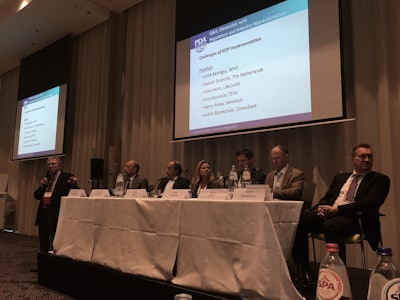
Each October, pharmaceutical experts, suppliers and end users come together to learn and share knowledge at the Parenteral Drug Association’s (PDA) Pharmaceutical Cold and Supply Chain Logistics Conference.
Though regulations surrounding supply chain security can be difficult to navigate, Rafik Bishara, PhD, Co-Chair of the event, reminded attendees at the Oct. 11-12, 2016 event that, “Quality is an advantage. Quality is a privilege. Quality is not a cost.”
A diverse panel discussed the challenges of GDP implementation and brought up the following considerations for the future:
-
Would the industry as a whole benefit from guidance for ocean shipping? DHL’s Nina Heinz pointed out that she sees parallels between the current state of the sea freight industry and that of air freight a few decades ago, before much needed standardization took place. The industry has yet to develop guidance for things like qualification for reefers (refrigerated containers) for shipping temperature-sensitive pharmaceuticals by sea.
-
Is enough being done now to prevent drug shortages in the future, once deadlines arrive for the Falsified Medicine Directive and serialization? Panelists were very concerned about drug shortages in cases where companies do not meet requirements, and that the inability to market products in certain countries will ultimately harm patients who depend on them. Bishara stated that while the industry may pay attention to this potential issue, regulators—including panelist Riekert Bruinink— are advising companies to be aware and prepare, “…especially if you are a sole supplier,” said Bishara.
-
Should the industry take a step back, and question the frequency of audits? How much is too much? Are there initiatives that members of industry can take on to uphold (and improve quality) without spending so much time preparing for and conducting audits? Some panelist expressed that while audits are necessary and positive experiences, the sheer number that customers, suppliers and other external bodies request is quite high. The panel discussed the possibility of mutual recognitions of audits by like organizations. This is not to stop audits from occurring or downplay their important, but just to be more creative in managing the activities because audits do take a lot of time and resources, some of which could potentially spent on making improvements. As we move toward data-based decisions, Heinz mentioned that one idea is to consider a risk-based analysis survey that would help determine if an audit needs to take place. “It would be worthwhile to do some brainstorming,” she said.


























